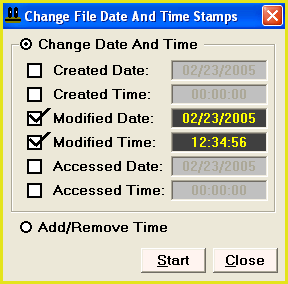
To obtain the current working directory, see GetCurrentDirectory.įor a list of common I/O tasks, see Common I/O Tasks. Relative path information is interpreted as relative to the current working directory. The path parameter is permitted to specify relative or absolute path information. Get the creation time of a well-known directory.ĭateTime dt = File::GetLastWriteTime( path ) Ĭonsole::WriteLine( "The last write time for this file was ", e.ToString()) Take an action that will affect the write time.įile::SetLastWriteTime( path, DateTime(1985,4,3) )
#Change file time stamp how to
How to change the Windows 8.1 and 10 local date and time To change the Windows 8.1 10 local date and time, please start / open the date and time properties settings Content / Tip / Solutions : 1. The following example checks the file system for the specified file, creating the file if necessary, and then sets and gets the last write time of the file. The solution is quite simple to use the timestamp of a particular Windows file or folder / directory File timestamp from file. With this Agent will keep the current timestamp as 'modified' on the file, but will store the proper mtime in database.LastWriteTime specifies a value outside the range of dates or times permitted for this operation. Add the following parameter to the Agents profile and restart the Agent ignore_mtime_assign_errors:true.
#Change file time stamp update
Change the owner of those files and restart the agent.Ī workaround for all platforms is to instruct Agent not to even try to update mtime, but rather keep it in database. By default, newly delivered files are owned by the user who runs the process, while this may be not the case of pre-seeded files. On linux it's required that only the owner of file can change files' modified timestamp to some specific (non-current) value. To access this function, select the files and folders. On windows it can be done from Advanced security settings on files and folders The Change Attributes & Times dialog lets you modify both the attributes of a file and its timestamps. Foreword: Starting with version 3.61 of NewFileTime, you can copy the time stamp of a video or image recording from the file name and set a new time stamp of the file time. The fix would be to allow the user who runs Agent's process to change files' attributes. This is especially the case for mounted network shares. Sometimes this may fail as the process may not be allowed to change files' attributes and the Agent gives the error. This basically means that Agent will perform "change attribute" operation on file. Open the file's properties to check and fix the attribute.Įrror code: SE_FS_INVALID_MODIFICATION_TIMEĪfter receiving the files, Agents will try and update the file's mtime to match that on the source Agent. File has invalid modification timeĪgents v3.2.2 and newer report the error message, which means that the "Date modified" attribute of the file is invalid - it might be 'in future' or zero or have any other invalid value. You can change the date and time formats. You can either change it to a fixed date/time, a date/time relative to the current. The format of the result depends on the date and time formats that were in use when the database file was created. Next, the objects pass to the Foreach-Object cmdlet, and the three time stamp properties change to the new value. With the timestamp method you can change the date and time of the filename.

You simply specify the filename as a command line parameter, no oother options are needed.

This portion of the function is shown here. The default behavior of touch command is to change all three timestamps associated with a file to the current system time. The Path parameter is a mandatory parameter. Resilio Connect Agents rely on modification timestamp (mtime) to know whether a file has changed and whether it needs to be delivered to other Agents. It accepts an array of file paths, and uses the current date and time for the new values.


 0 kommentar(er)
0 kommentar(er)
